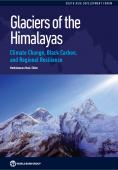
Melting glaciers and the loss of seasonal snow pose significant risks to the stability of water resources in South Asia. Climate change and deposits of anthropogenic black carbon (BC) are the major drivers of the accelerating glacier melt. This report investigates the extent to which the BC reduction policies of South Asian countries may affect glacier formation and melt within the context of a changing global climate. It assesses the relative impact of each source of black carbon on snow and glacier dynamics. The authors simulate how BC emissions interact with projected climate scenarios, estimate the extent to which these glacial processes affect water resources in downstream areas of these river basins, and present scenarios until 2040.
This report provides an up-to-date overview of existing and emerging carbon pricing instruments around the world, including international, national and subnational initiatives.
The fifth Carbon Pricing Leadership Report highlights examples of leadership in the field of carbon pricing in 2020/21. It also covers the activities of the Carbon Pricing Leadership Coalition during the year. The intention is to inspire governments, business leaders, and other relevant stakeholders from around the world to use carbon pricing as a tool for effective climate action in support of sustainable development.
This paper categorizes actions that can be taken to enhance NDCs with climate-friendly cooling, summarizing the work being done in 10 countries, as well as signposting how an additional 45 countries have included climatefriendly cooling in their enhanced NDCs. This paper categorizes the types of action that countries can take to enhance their NDCs with climate-friendly cooling.
This report aims to help financial decision-makers to align finance with sustainable development, accelerating the transition to a net-zero, climate resilient economy, based on the latest scientific findings and policy developments.
